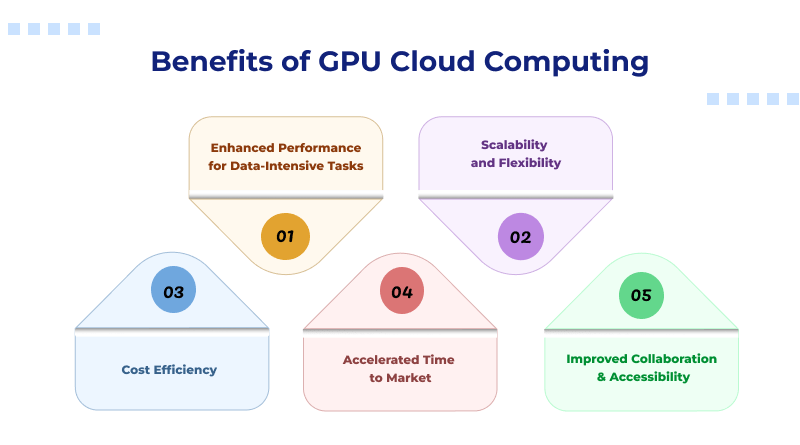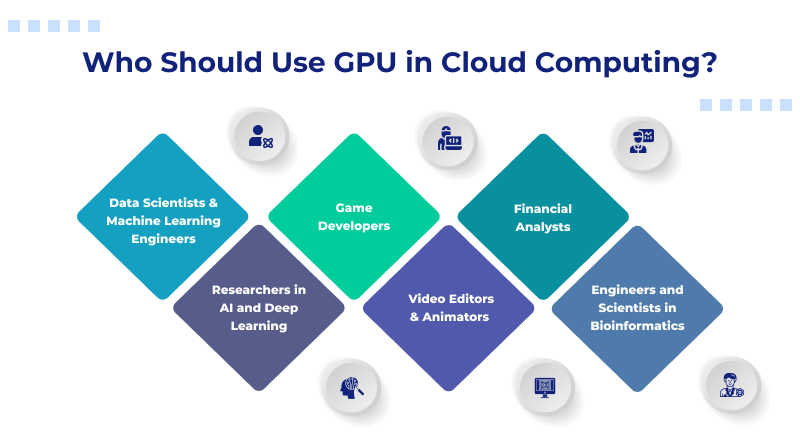GPU cloud computing is an advanced technology that allows businesses to access high-performance computing resources. Mission-critical applications like AI/ML, gaming, and others that require extensive hardware upgrades and resources. The technology used in it accelerates data processing and enhances AI along with the machine learning capabilities.
GPU cloud computing has become a popular option and thus GPU hosting services are introduced. GPU hosting services give the robust IT infrastructure to host resource-intensive websites and applications. Due to their immense potential, it handles workloads like parallel processing, scientific simulations, and more.
Table Of Content
What is a GPU?
Modern-age computer’s potential is determined by its central processing unit (CPU) power. It is an essential computer component that enables fast mathematical and logical operations as well as software execution, I/O devices (input/output devices), and a range of other resources.
Several complex calculations involve graphical processing power. Video games, digital art, and movie production require extensive processing power. Hence, GPU (Graphic Processing Unit) comes into the picture. A GPU has a specialized procession that is built specifically to manage complex calculations for image and video rendering. Several modern computers use it for gaming, video editing, and other graphic-intensive tasks.
The GPU’s primary function is to process and display images and video, and perform other types of calculations. For instance, many next-gen GPUs are powerful enough to be used for mathematical and scientific applications like data analysis, IoT, and Machine Learning.
CPUs and GPUs are different from conventional processors as they are designed to perform calculations simultaneously. Modern day GPUs have hundreds or even thousands of processor cores, which allow them to handle complicated tasks much faster than conventional CPUs.
Benefits of GPU Cloud Computing
GPU cloud computing is structured as an operational expense or a capital expenditure solution. Enterprises looking for High-Performance Computing (HPC) applications get the advantage of web hosting mission-critical websites and applications. Advantages like enhanced resource efficiency and flexibility, accelerated processing speeds, quicker deployment, and global accessibility are possible with the help of GPUs. Below, we have mentioned several benefits of GPU cloud computing.

1. Enhanced Performance for Data-Intensive Tasks
GPU cloud computing is designed to handle data-intensive tasks that conventional CPUs struggle with. Whether it’s AI, machine learning, or big data analytics, GPUs accelerate these processes, enabling faster results. For enterprises, this means quicker decision-making and the ability to tackle more complex projects without being bogged down by processing limitations. This enhanced performance can translate into a significant competitive edge, allowing businesses to innovate faster and more efficiently. You can look at it as an alternative to dedicated hosting servers.
The impact of this enhanced performance is profound, especially for industries where real-time data processing is critical. For instance, financial institutions can process transactions and detect fraud swiftly. Also, healthcare organizations can analyze vast amounts of patient data to enhance diagnostics. By leveraging GPU cloud computing, enterprises can push the boundaries of what’s possible, exploring new areas of research and development that were previously unattainable due to computational constraints.
2. Scalability and Flexibility
One of the biggest perks of GPU cloud computing is its scalability. Enterprises can easily scale their computing power up or down based on their current needs without investing in expensive on-premises hardware. This flexibility ensures that businesses only pay for what they use, making it a cost-effective solution for fluctuating workloads. Whether you are launching a new project or expanding an existing one, GPU cloud computing adapts to your needs, allowing for seamless growth and adaptability.
This level of scalability also means that businesses can handle unexpected traffic spikes in demand without missing a beat. For instance, eCommerce companies can scale up their resources during peak shopping seasons, ensuring a smooth customer experience without long-term hardware investments. Similarly, research institutions can allocate more GPU power during intensive data analysis periods and scale back once the project is completed, optimizing resource usage and minimizing waste.
3. Cost Efficiency
While the initial investment in GPU technology can be hefty, GPU cloud computing offers a more cost-effective alternative. This is because GPU cloud computing has costs based on a pay-as-you-go basis. This not only reduces capital expenditure but also minimizes the operational costs associated with managing and upgrading hardware. By leveraging GPU cloud services, businesses can allocate resources more efficiently, focusing on growth and innovation rather than infrastructure.
Moreover, the cost efficiency extends to energy savings as well. Third-party GPU cloud server system operations require less energy than on-premises. Hence, it is also an environmentally friendly option. In this manner, it is also a sustainable initiative aligning with the growing emphasis on corporate social responsibility.
4. Accelerated Time to Market
In a world where speed is everything, GPU cloud computing can significantly reduce the time it takes to bring products and services to market. By speeding up data processing and analysis, enterprises can iterate faster, make informed decisions, and respond quickly to market demands. This accelerated time to market can be a crucial factor in staying ahead of the competition, allowing businesses to capitalize on new opportunities more swiftly and effectively.
Faster time to market also means that companies can quickly test and refine their products or services based on real-world feedback. This agility allows for continuous improvement, ensuring that offerings remain relevant and competitive. In industries like software development, where updates and new features are frequent, GPU cloud computing can be the key to maintaining a leading position by enabling rapid prototyping, testing, and deployment.
5. Improved Collaboration and Accessibility
GPU cloud computing enables better collaboration across teams, regardless of their geographical location. By using cloud hosting, multiple users can access and work on the same datasets simultaneously, facilitating real-time collaboration and reducing bottlenecks. Additionally, the cloud-based nature of GPU computing means that resources are accessible from anywhere, at any time, providing enterprises with the flexibility to operate in a more decentralized and agile manner.
This accessibility is particularly beneficial in the era of remote work, where teams are often distributed across different time zones. GPU cloud computing ensures that all team members have equal access to the necessary tools and data, fostering a more inclusive and efficient work environment. Furthermore, it enables enterprises to tap into global talent pools, as team members can collaborate on high-performance tasks without being limited by their location or hardware capabilities.
Who Should Use GPU in Cloud Computing?
1. Data Scientists and Machine Learning Engineers
If you are a data scientist or machine learning engineer, GPU cloud computing is your best friend. Imagine trying to train a deep learning model with a massive dataset. Without GPUs, it could take forever. But with GPUs, you get the power to process all that data in record time. It’s like having a supercharged engine for your data-crunching needs.
Plus, GPUs are fantastic for running complex algorithms and simulations. So, if you want to speed up your model training or make sense of big data faster, GPU cloud computing will be a game-changer for you.

2. Researchers in AI and Deep Learning
Researchers working in AI and deep learning know how demanding their tasks can be. Training neural networks and running simulations often require serious computational power. That’s where GPU cloud computing steps in. With the immense parallel processing capabilities of GPUs, you can get your research results quickly.
Imagine having the ability to run multiple experiments simultaneously without bogged down. It’s like having a lab full of powerful machines but without the need for all the physical hardware. This way, you can focus on the exciting part—discovering new insights and innovations.
3. Game Developers
For game developers, GPU cloud computing is a dream come true. Developing and testing graphics-intensive games can be incredibly demanding on your hardware. GPUs handle all the heavy lifting when it comes to rendering high-quality graphics and running complex game physics.
Instead of being limited by your local hardware, you can leverage GPU cloud computing to work on games with stunning visuals and smooth performance. It’s like having a state-of-the-art graphics card without having to buy one for every developer on your team.
4. Video Editors and Animators
Video editors and animators deal with high-resolution footage and complex effects. Rendering these can take a lot of time on standard CPUs. GPU cloud computing can drastically cut down those rendering times by handling the heavy lifting with its powerful parallel processing capabilities.
Think of it as having a turbo boost for your video production. You can render and process videos faster, allowing you to get your final product to your clients or audiences more quickly. It’s a real productivity booster in the world of video editing and animation.
5. Financial Analysts
Financial analysts who deal with real-time trading, risk management, and complex financial models will find GPU cloud computing incredibly useful. GPUs can perform vast amounts of calculations quickly, which is crucial for real-time analysis and decision-making.
Instead of waiting ages for your models to compute, you can get faster results and make timely decisions. It’s like having a supercharged calculator that helps you stay ahead in the fast-paced world of finance.
6. Engineers and Scientists in Bioinformatics
In fields like bioinformatics, engineers and scientists often work with huge datasets and perform complex simulations. GPU cloud computing provides the power needed to analyze genetic data, run simulations, and process large volumes of information efficiently.
With GPUs, you can accelerate your research and get insights faster. It’s like having a high-performance workstation at your fingertips but without the need to invest in expensive hardware. This means more time for discovery and less time waiting on computations.
Incorporating GPUs into cloud computing represents a transformative shift for many sectors, offering unparalleled performance and flexibility. By leveraging GPUs in the cloud, businesses can accelerate their data processing capabilities, from handling complex computations and simulations to enhancing machine learning models, and artificial intelligence applications. The ability to tap into high-performance GPUs on demand allows companies to scale their resources efficiently without the need for substantial upfront investments in hardware.
Moreover, cloud-based GPUs offer a level of convenience and accessibility that conventional on-premises solutions often lack. With cloud providers managing the infrastructure, users benefit from reduced maintenance costs and the freedom to focus on their core projects rather than dealing with hardware issues. This on-demand access ensures that businesses can rapidly adjust their computing power according to their needs, promoting a more agile and cost-effective approach to handling intensive tasks.
Finally, GPU integration in the cloud is a game-changer for innovation and collaboration. It enables teams to work together seamlessly on complex projects, regardless of their geographical locations, by providing a centralized platform for high-performance computing. As cloud technology continues to evolve, the synergy between GPUs and cloud services will undoubtedly drive further advancements, empowering organizations to achieve new levels of efficiency and innovation.








